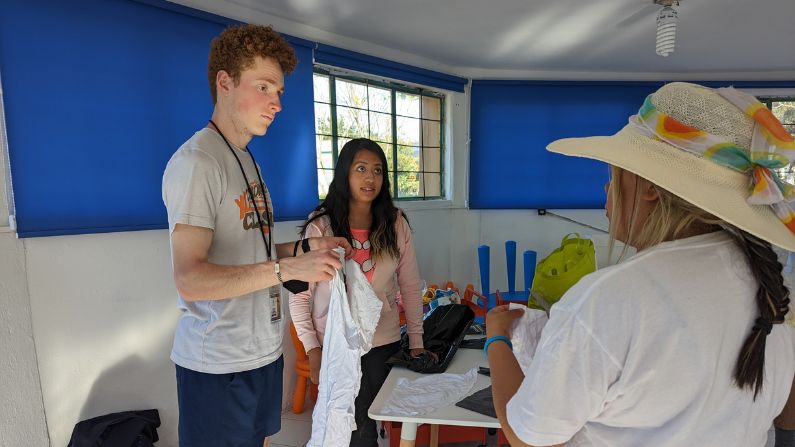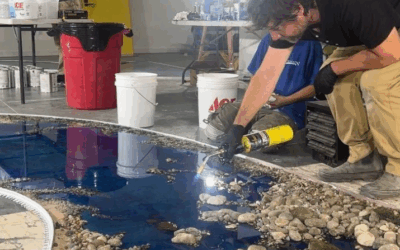Unless you’re a state dignitary, it’s not often that a visit abroad comes with ceremonies replete with a mariachi band, dances, and banquet meals – but that’s how Jackson Hole High School students and teachers were welcomed in Tlaxcala.
Tlaxcala is Mexico’s smallest state, about two hours east of the capital, Mexico City, and the region where the majority of Jackson’s Latino community traces its roots. The capital of the state, also named Tlaxcala, officially became Jackson’s sister city last year.
The goal of the new exchange program is to connect students in the two communities, as well as to increase the sense of belonging for students of Mexican and Tlaxcalan heritage at Jackson Hole High School. Students from Tlaxcala will be visiting Jackson in 2023. Jeff Brazil is a social studies teacher at the high school and a coordinator of the program. He said the exchange is the most exciting program he’s seen during his 20 years at the school.
“We’re looking at trying to develop a more inclusive school. You know, as much progress as the district has made, when I look at our lunchrooms or our hallways, it’s very divided between Anglo groups and Latino groups,” Brazil said. “So, I’m really trying to figure out a way that we can, in a more student-centered way and in an informal way, try to break those barriers down.”
People have been immigrating to Jackson from Tlaxcala since the mid-to-late-1990s, and while some stay for a few years and then return to their hometowns in Mexico, many others have stayed and made Jackson home. Indeed, six of the eight Latino students from Jackson who participated in the exchange have family connections in Tlaxcala.
Nicole Checker is a rising senior and one of the main student organizers of the trip. Though she doesn’t have roots in Tlaxcala, Checker saw the trip as an opportunity to help bridge the gap between Latino and non-Latino students. “Being a Latina in a school that is predominantly white, I see the segregation. And not because we’re forced to be segregated, but we kind of just do it on our own,” Checker said.
The goal of the program resonated with a lot of students; more than 80 applied to participate. From Jackson, eight Latino students were selected and eight white students – a split that was intentional. Sixteen students also participated from the Mexican side of the exchange, including 16-year-old Michael Vasquez from San Simeón Xipetzinco.
“I want to give a good impression from my country and from my state,” Vasquez said, explaining his interest in the program. “So, it was something that I felt like was really special.”
During their weeklong visit, the Jackson students stayed at an 18th-century hacienda that was previously used to cultivate maguey, a type of agave. They also got to hike a volcano, visit ancient ruins and even volunteered at a children’s library that Jackson residents helped fund.
But reconnecting with family was the highlight of the trip for many in the group. The grandfather and uncle of 15-year-old Michelle Tzompa Juarez surprised her with a visit on her first day – or rather they tried to surprise her.
“I recognized them like automatically because I still remember what they look like. But my grandpa and my uncle didn’t recognize me just because the last time I saw them was in, like, elementary school,” Tzompa Juarez said.
Student Brian Diaz Morillon is embraced by family members in San Simeon Xipetzinco. (Emily Cohen/KHOL)
For some of the students’ families living in Jackson, returning to Mexico isn’t as easy as just buying a plane ticket. Some came to the United States without documentation, so if they leave the country to visit family, they’d be unable to return without a green card or resident status.
On the other hand, visiting the U.S. for relatives in Mexico can also be a challenge. Not only is the cost of travel high, but it can also take a while to get a tourist visa. That’s a current barrier for Tzompa Juarez’s Mexican family. She said they recently applied to go to get visas but their interview isn’t until 2023.
Still, even though Jackson and Tlaxcala are 2,000 miles apart, the communities are inextricably linked. KHOL spotted Wyoming license plates while in Mexico, as well as people wearing Jackson Hole t-shirts. There was even a home designed in the so-called “new west” building style – complete with a sculpture of elk at the front gates.
For Checker, the student organizer, the trip gave Jackson kids an appreciation of both their own culture and that of their peers. More importantly, it gave Latino and non-Latino students something to connect over. She also said the trip helped her reconnect with her own culture.
“I was born and raised here and a lot of our [Latino] students were as well. So, you know… over the years, when you’re in a predominately white school or predominantly white community, you do sometimes lose part of your culture,” Checker said. “But just kind of experiencing that aspect of my identity again was honestly amazing, and seeing other people experience that [was] as well, too.”
Now that the students are back in Jackson, Checker said she’s hopeful that the shared Tlaxcala experience will help reduce self-segregation. “Like, there’s another friendly face in the classroom,” she said. “You know, if the teachers are like, ‘Go [split up] in partners,’ I know that I can turn to the people around me.”
Jackson Hole High School social worker Piper Worthington also said the exchange program plants a seed for an even greater impact in the community. That’s because the participating students come home and share their experiences with parents, siblings and friends.
“I will certainly be curious to see how this translates. You know, I think in the long run, if you were to paint a picture, it would be kind of like, just a healthy school culture in general or a healthy community in general, where everyone feels like they have access to the same spaces and feels that sense of connection or that sense of belonging together,” Worthington said.
And while there’s no perfect formula to make that happen, the hope is that the exchange program brings Jackson one step closer to a more inclusive and connected community.






